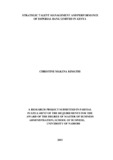Strategic Talent Management and Performance of Imperial Bank Limited in Kenya

View/
Date
2015Author
Kimathi, Christine M
Type
ThesisLanguage
enMetadata
Show full item recordAbstract
Most commercial banks have realized the worth of recruiting and retaining competent
employees. To survive in the banking environment banks need to be equipped with
talented and competent employees who are efficient and effective in their work.
Imperial Bank Limited is one of the commercial banks in Kenya that consider talent
management as an essential tool for enhancing organizational performance. This is
achieved through providing quality and professional services in manner that meets
customer satisfaction. The study sought to determine the how strategic talent
management influence performance of Imperial Bank Limited in Kenya. To achieve
the objective of this study, the study used a case study research design. The study
targeted five departmental heads in Imperial Bank. Data was collected using an
interview guide and data analysis was done using content analysis. The study
successfully managed to interview all the interviewees who were: human resource
department, marketing department, operations department, the finance department and
Information Technology department. The chapter consists of data analysis, results and
discussion from the data that was collected using interview guides. The study
concludes that the most common strategic talent management practices used by
Imperial Bank were as follows: performance-based reward system in terms of annual
bonuses and salary increments, performance-based promotions, training programs and
ensuring performance is measured based on well communicated specific, measurable,
accurate, realistic and time bound targets and objectives. The findings further revealed
that regular training programs were held both internally and externally. The study
further revealed that Imperial Bank developed and exploited special characteristics of
knowledge to improve organizational performance through mentorship, coaching to
allow for promotions, career development through staff assistance academic programs
for top performers, management development for succession planning, customer
experience, excellent customer service, internal and external training to enhance skills
and knowledge. The study recommended that that policy makers and governing
bodies should set policies that promote and support commercial banks to adopt and
implement strategic talent management in order to improve performance. The study
was limited to scope; it only concentrated with Imperial Bank therefore the findings
obtained in this study cannot be however used to make generalization for all
commercial banks in Kenya. These findings can only be used for comparative
purposes and not direct application to other sectors. Future researchers should
consider replicating this study in the whole of banking industry like commercial
banks. Other sectors like insurance companies would also be suitable to provide
comparative findings. This will give a more detailed view of the nature of the
relationship identified in the study. It would be appropriate to study the relationship
between strategic talent management and organizational performance of commercial
banks. The replication of this study in other countries especially in the Sub-
Saharan region would demonstrate the universality and significance of strategic
talent management practices and organizational performance relationship in general.
Publisher
University of Nairobi
